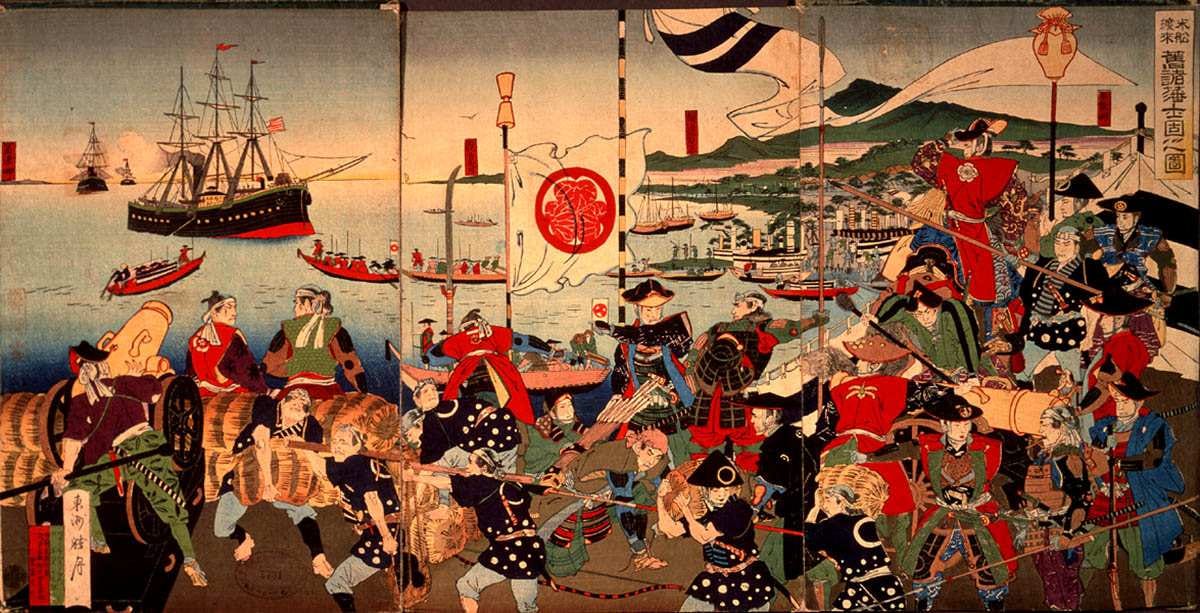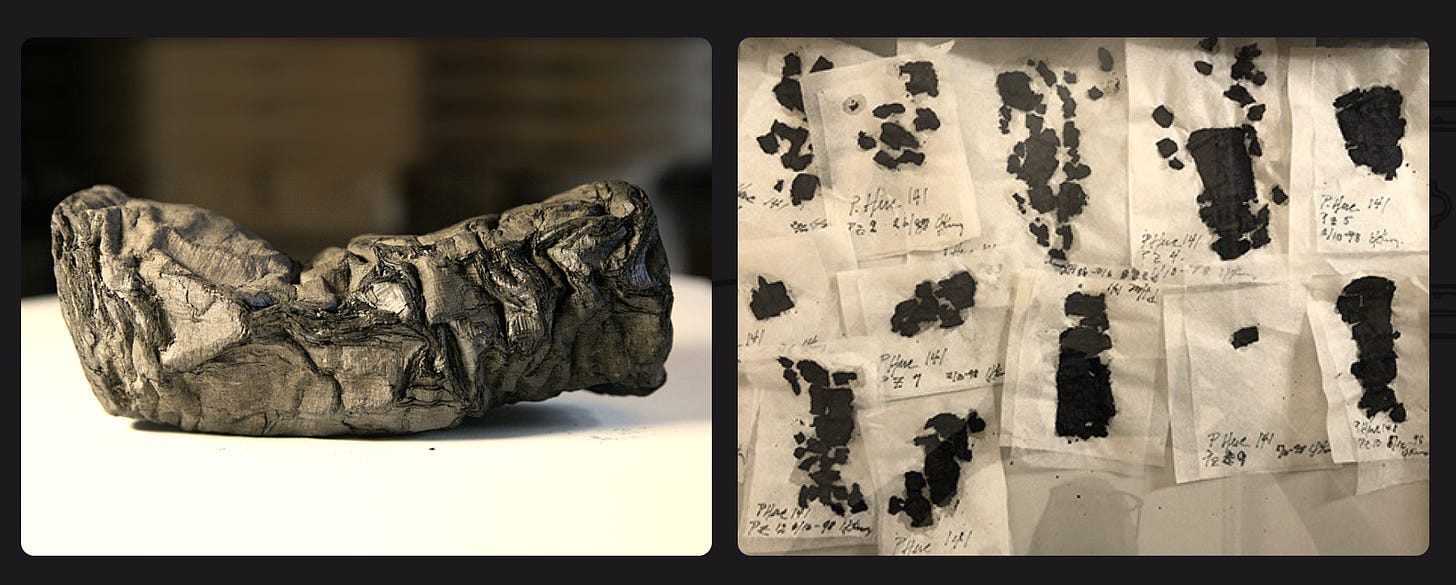📈 first Derivative [108]
🤖 AI video—🇲🇩 casus belli—💊 abortion pill—🛰 space capitalism—🇮🇩 Indonesia president—📜 ancient scrolls—🍺 Bud Light—🪦 notable deaths
🎬⚔️ I saw Dune: Part Two on Monday. I’m still collecting my thoughts but highly recommend going to see it in theaters on as big a screen as possible. It’s longer but also more fun, action-packed, and cinematic than the first one. And if you haven’t seen it before, I highly recommend watching Lawrence of Arabia1 which itself was a major inspiration for Dune. I enjoyed the second Dune but after, I couldn’t help wondering what a director like David Lean (The Bridge on the River Kwai, Doctor Zhivago) would do with the material.
I’ve also been watching Shōgun, FX’s new series based on the James Clavell novel by the same name, itself based on the true story of William Adams, an English sailor who ended up stranded in Japan and becoming involved with the political intrigue of the samurai lords of the Sengoku period. It’s a fascinating period of history and I’m always interested in how states are formed, and how political authority and legitimacy are created. The show itself seems well-made so far (3 episodes in) with a lot of money and attention paid to period-accurate detail. And having recently finished the fourth season of True Detective, it’s been refreshing to see storytelling done well with more thoughtful choices behind it. I’m not sure it rises to the quality of the first season of Game of Thrones (which holds up, go back and rewatch it), but the fact that people are even making that comparison is encouraging. In a way, it’s fitting too. The book was a bestseller and the 1980 miniseries adaptation was so popular that almost a third of TV households watched it.
I also recently watched the Civil War movie Glory (1989)2 and got to see a Q&A with the director, Edward Zwick (Blood Diamond, The Last Samurai), who talked about how he, having only done TV work up until then, watched Akira Kurosawa’s Ran “600 times” over and over to study how to direct a movie with big battle set pieces for the big screen. I haven’t watched Ran yet, but it made me think of the chain of cultural influence at play here. An American director (who would also go on to make his own samurai film) studying an adaptation of Shakespeare by a Japanese director3, himself influenced by American directors like John Ford4, who filmed the Civil War segment of How the West was Won and famously directed The Searchers, the protagonist of which is a Civil War veteran.
If the cultural connections are crossing all around the globe, I was surprised at how compact the time periods are here. The Meiji Restoration happens three years after the end of the American Civil War, and Zwick’s The Last Samurai closes the historical era that Shōgun is opening. With Japan too, the Portuguese arrive there only 22 years after Hernán Cortés takes Tenochtitlán in Mexico, which I was reading about last month.
This has gotten a bit longer than I intended, but one last thing about Dune 2, Glory, Shōgun, Conquistador. For all its sci-fi futurism, the world of Dune is one where the fate and fortunes of Great Houses and their lords basically depend on hand-to-hand combat.56 In Shōgun, the great lords have vassals who will die for them but they also fight in their battles and risk their own lives. There’s a scene in Glory where Robert Gould Shaw, the 25-year-old Boston Brahmin, takes a moment before the final battle (clip) and has a moment of Transcendentalist reflection7 that reminded me of the death poems of the samurai. It’s hard to imagine the scion of an elite American family today not only serving in war but seeking out the most dangerous assignments. And for what? Honor, glory? Looking at it that way, Civil War America feels closer to feudal Japan than it does to modern American society. The Shaw of today is probably doing ESG investing at Goldman and/or running a vanity nonprofit.8 Our Toranaga (Tokugawa) of today is Zuckerberg doing Brazilian jiu-jitsu.
The accusation of draft-dodging used to mean something it no longer does. But if it’s not something we demand anymore, we still respect leadership that puts their own life on the line. It’s why people respond strongly to figures like Alexei Navalny or Volodymyr Zelenskyy who turned down an evacuation offer and posted an incredibly moving video from the streets of Kyiv when most had written off Ukraine’s chances.9 On the whole, it’s good that the average person’s life is less violent than it was in past eras. But at the risk of sounding atavistic, it may not be as good that it’s easier now than ever to amass so much authority, and command so many lives, while pledging so little.
Good reading,
—TK
🤖📹 OpenAI launched, Sora, its text-to-video AI product.
…the San Francisco start-up OpenAI has unveiled a similar system that creates videos that look as if they were lifted from a Hollywood movie. A demonstration included short videos — created in minutes — of woolly mammoths trotting through a snowy meadow, a monster gazing at a melting candle and a Tokyo street scene seemingly shot by a camera swooping across the city.
This one blew my mind. One of my favorite GenAI follows, Nick St. Pierre, posted a thread of side-by-side comparisons of Sora and Midjourney outputs from the same prompts. Highly recommend checking it out. Sora isn’t the first text-to-video, but just compare its output to Runway’s Gen-2 from 11 months ago. Both demo videos probably featured the best output they could make but Sora’s outputs are missing the shaky Impressionist effect of constant variations from frame to frame. I have to admit I’m surprised at the speed of progress here. Clearly, I’m not the only one. I’ve also put my $800m studio expansion on hold.
Russian news reports quoted Vadim Krasnoselsky, the enclave’s professed president, as calling for help from Moscow because “a policy of genocide is being applied against Transnistria.” Similar incendiary and evidence-free claims were made for years by Russian proxies in eastern Ukraine and used by Moscow to help justify its 2022 invasion.
But Transnistria stopped far short of requesting annexation by Russia — something Moldova had feared it might do — and also called for help from the European Parliament, the Organization for Security and Cooperation in Europe and the Red Cross.
Also the same playbook used with Abkhazia and South Ossetia against Georgia in 2008.
The companies said they would distribute the pill in a way consistent with state laws—meaning it won’t be offered in states that don’t allow legal access to abortion through 10 weeks—and will begin rolling out the pill in a handful of states. Both said they wouldn’t make mifepristone available via mail order. The drug is already available via other mail-order pharmacies and telehealth platforms…
The abortion pill remains at the center of litigation due to be argued later this month in the Supreme Court. The court is set to consider whether the FDA properly loosened restrictions around the pill. The court could decide to reinstate the pill’s original safeguards, which would then mean the pharmacies would have to stop dispensing.
Getting to the moon has proved to be a tricky feat to pull off. Other than the United States, only the government space programs of the Soviet Union, China, India and Japan have successfully put robotic landers on the moon’s surface. Two companies — Ispace of Japan and Astrobotic Technology of Pittsburgh — had previously tried and failed, as has an Israeli nonprofit, SpaceIL.
🇮🇩🗳 Indonesia’s defense minister, Prabowo Subianto, will become the country’s next president after early election results.
The election in Indonesia matters far beyond its borders. The world’s fourth-most-populous country, it is of growing strategic importance to both the United States and China. Indonesia is one of the world’s top producers of coal, palm oil and nickel, and it sits atop the supply chains of many international companies. All of that means it will have a major bearing on the future of the climate change crisis, as well.
Mr. Prabowo has coveted the presidency for decades and has tried on different public personas to court voters. But what finally pushed him over the line was the implicit support of the popular outgoing president, Joko Widodo, whose son Gibran Rakabuming Raka is Mr. Prabowo’s running mate.
[Luke Farritor] was an intern at SpaceX last year, listening to [Nat Friedman] on a podcast while driving to the company’s Starbase facility in Boca Chica, Texas, when he heard about the Vesuvius Challenge. It wasn’t just one thing about the contest that he found alluring. It was everything: the money, the historical significance, the chance to impress his heroes, the idea of bringing tech to new (and old) fields and the sheer adventure of it all. “I also just enjoy working on projects,” Farritor told me. “I can scroll through TikTok, or I can work on this.”
Thought this was very cool, applying the latest tech to other fields, and a welcome break from AI doom and gloom. It’s amazing what can be done when smart young people are technologically enabled, organized, and incentivized. Would love to see more people sponsor bounties like this.
Last summer, Farritor moved back to Nebraska, where he lived with five computers in his dorm room, and his AI model spotted a string of 10 letters that spelled porphyras—purple.
This made Farritor the first person in two millennia to read a word in the unopened Herculaneum papyri. It also made him $40,000.
🍺📉 Bud Light sales are still down 30% through this year’s Super Bowl vs. last year. I wrote a bit about the rise of Modelo, the top-selling US beer, in fD85
Modelo last May unseated Bud Light as the top-selling U.S. beer by dollar sales, after a Bud Light boycott began in April. Bud Light’s sales still haven’t recovered. The brand’s sales volume was down by 30% in the two-week period ended Feb. 17, compared with the same period a year earlier, Bump Williams said.
The marketing debacle and subsequent boycott from last year are having such a lasting impact. Big brands can be more fragile than you’d think.
🪦 Notable Deaths
🇷🇺 Feb 16 - Alexei Navalny was born in 1976 in Butyn, Russia and died at the age of 47, likely killed or allowed to die on the orders of Vladimir Putin. Navalny was an opposition leader in Russia and worked to uncover corruption in the Putin regime.
Yet even from prison, Mr. Navalny remained an unflinching critic of Mr. Putin, a former K.G.B. officer whom he accused of corruptly skimming the country’s oil profits to enrich his friends and entourage in the security services. Mr. Putin’s political party, he once said, was a party of “swindlers and thieves,” and he accused the president of trying to turn Russia into a “feudal state”…
Mr. Navalny was known for his innovative tactics in fighting corruption and promoting democracy. Defying expectations, he cannily used street politics and social media to build a tenacious opposition movement, even after much of the independent news media in Russia was squelched and other critics were driven into exile or killed in unsolved murders.
Navalny was the target of repeated assassination attempts, most notably and dramatically in 2020 when he was poisoned with a nerve agent. The documentary Navalny (on Max) covers the poisoning and the aftermath including his live extraction of a confession from one of his assassins. After recovering in Germany, Navalny returned to Russia willingly returned to Russia where he was immediately arrested and remained in prison until his death.
On as big a screen as possible
Who lived through and began his directing work during WW2
Born 29 years after the American Civil War
In a sense, Dune with its shield technology, is post-gun, having reverted back to the sword. Shōgun is pre-gun but in a time when the sword is giving way to the gun and cannon. Same with Glory although it’s notable that officers like Shaw still carry a long saber into battle. Probably deserves its own post and something I should read it into but it’s easy to imagine how firearms made feudal warriors less necessary military, financially, and in terms of leading men into hand-to-hand combat and that also the impersonal violence and death of firearms and artillery significantly undermined.
This is also what makes it hard for me to buy Timothée Chalamet as Paul Atreides. In the world of the movie, on some level, Paul Atreides basically has to look like and act like someone who people would fight and die for, especially a people as hard as the Fremen. Chalamet is a great actor but I don’t think he has this particular kind of charisma.
Or is he a self-professed effective altruist running a tech unicorn that promises to change the world? One thing I can respect about the characters in How to Blow Up a Pipeline is how seriously they take their convictions.
Compare that to Ashraf Ghani who fled the Taliban








Feel like I’m in a Time Machine, I love it